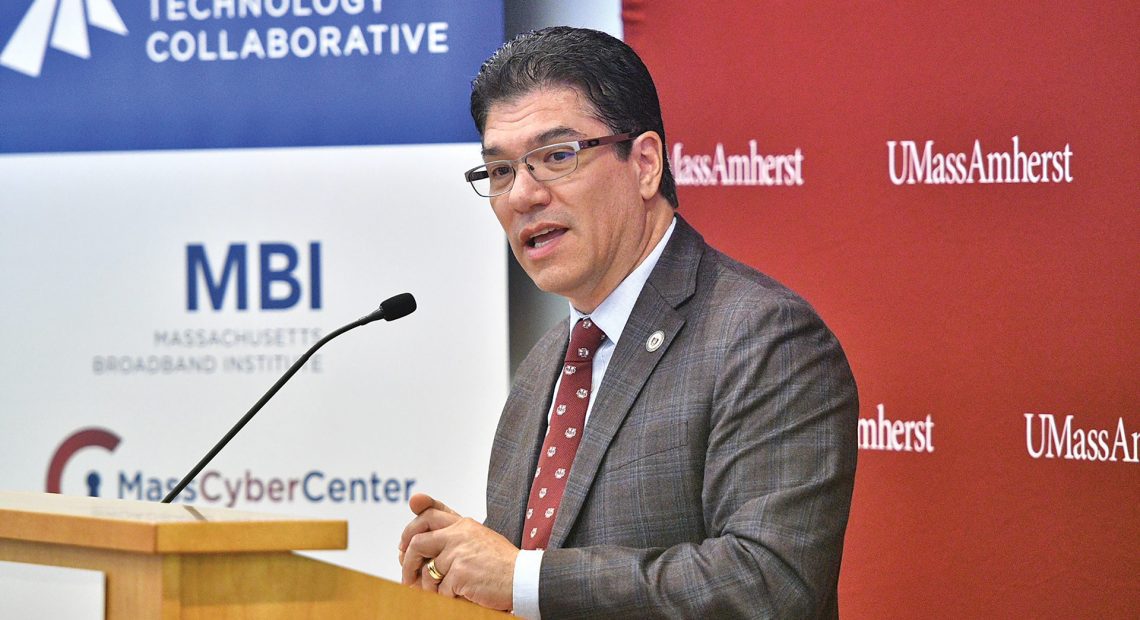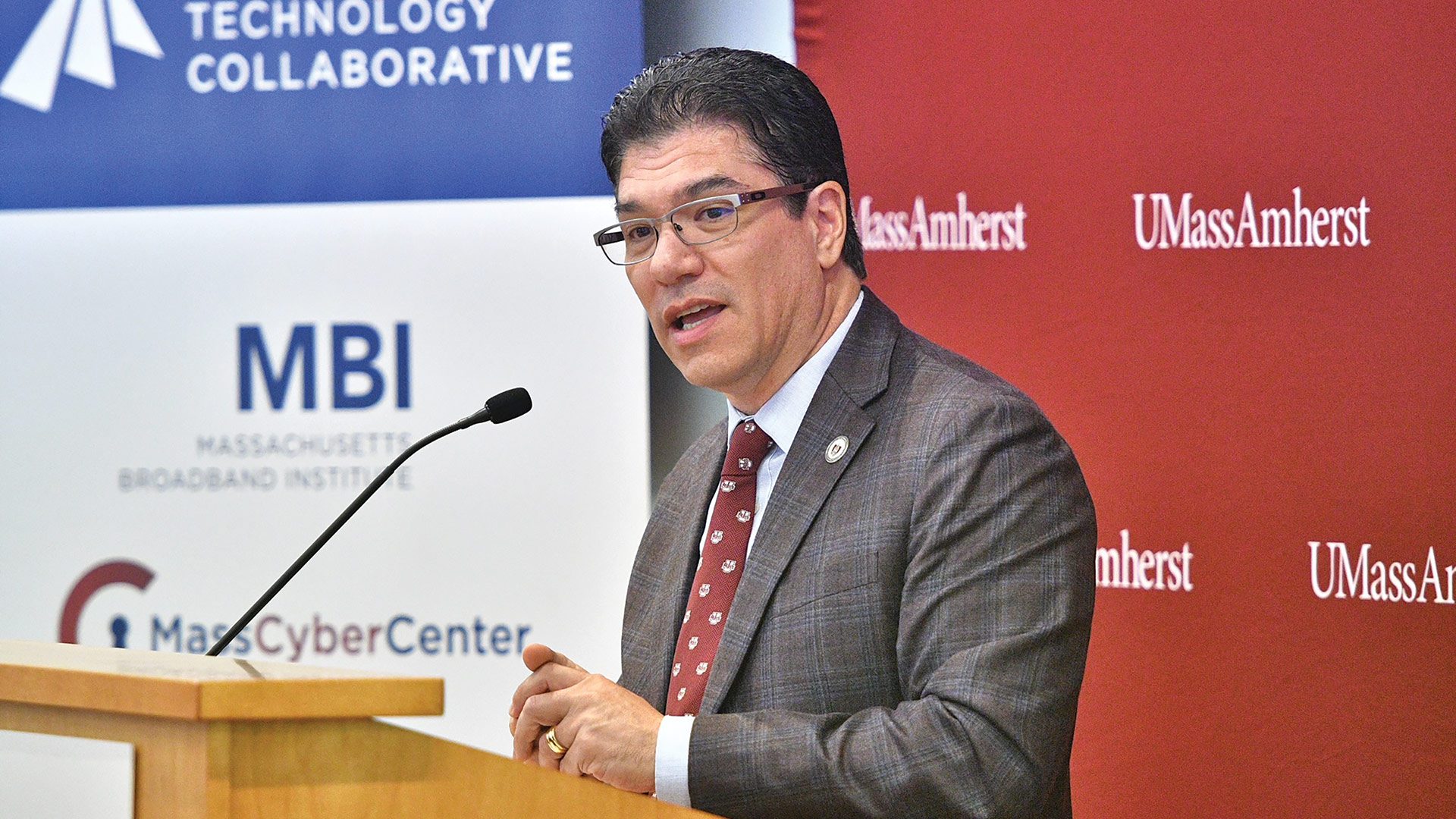
MassTech Collaborative Awards $5 Million to UMass Amherst
Expanding the Talent Pipeline

UMass Amherst Chancellor Javier Reyes speaks during the announcement of the $5 million grant from the MassTech Collaborative.
Leaders from the Massachusetts Technology Collaborative, also known as MassTech, recently announced a $5 million award from the Healey-Driscoll administration to UMass Amherst to help create an open-access additive manufacturing and design/testing facility on campus.
The grant, from the Collaborative Research and Development (R&D) Matching Grant Program, will augment UMass Amherst’s capabilities in the advanced-manufacturing space and increase its collaboration with universities across Massachusetts around research and development for advanced optical technologies, which have applications in biotechnology, defense, aerospace, environmental monitoring, and general electronics.
“The Healey-Driscoll administration is committed to building a more dynamic manufacturing ecosystem by supporting research and development opportunities across the state,” said Secretary Yvonne Hao of the Executive Office of Economic Development. “This investment will help connect leading innovators, foster workforce opportunities, promote creative problem solving, and accelerate the potential for breakthroughs in a field that underpins so many other essential industries.”
Carolyn Kirk, executive director of MassTech, added that “this investment is another example of Massachusetts’ commitment to strengthening innovative technologies and making R&D tools more accessible to growing businesses, academic researchers, and entrepreneurs across the state, providing opportunities that would normally be cost-prohibitive. Placing it at our flagship university, which has a track record of proven success and partnerships in the advanced-manufacturing space, made perfect sense. When we invest in technical training at a leading institution like this, we can expand training opportunities and the talent pipeline to manufacturing careers, helping diversify our workforce and the ability of the state to compete on a global scale.”
The announcement comes on the heels of the state’s recent award of $19.7 million in funding through the federal CHIPS and Science Act to expand production of microelectronics in the Northeast, work that will benefit from increased R&D in related sectors, including advanced optical technologies.
“We’re proud to make this investment in UMass Amherst to help establish a first-of-its-kind open-access facility that will expand our capability for innovation and strengthen training opportunities in a sector that will be so critical to the future of our economy.”
“Optical technologies are essential in the 21st century, acting as the backbone for transformational industries ranging from semiconductors to mobile technologies, medicine to national defense,” said Pat Larkin, director of the Innovation Institute at MassTech, which manages the collaborative R&D grant program. “That’s why it is critically important to expand collaboration and partnerships in this space, to encourage increased engagement between research institutions and private industry. We’re proud to make this investment in UMass Amherst to help establish a first-of-its-kind open-access facility that will expand our capability for innovation and strengthen training opportunities in a sector that will be so critical to the future of our economy.”
The facility will be the first publicly accessible facility of its kind in the country and will support testing, research, and production of advanced optical technologies. Through the project, UMass Amherst will collaborate with Electro Magnetic Applications Inc. (EMA), which specializes in the testing and design of materials used in space and operates at the Berkshire Innovation Center (BIC) in Pittsfield, and other industry partners, as well as Northeastern University, Springfield Technical Community College, and Berkshire Community College. The BIC will act as a bridge between industry, academia, and government to help develop an additive-manufacturing talent pipeline by providing workforce-development opportunities for students and young professionals.
“For 160 years, UMass Amherst has been an incubator for revolutionary thinking and big ideas,” UMass Amherst Chancellor Javier Reyes said. “Today we further this legacy as we celebrate advancements in precision optics, coatings, and metalens technologies in Western Mass. and prepare to establish an advanced optics manufacturing and characterization facility right here at UMass. By bringing together leading scientists, engineers, researchers, and industry partners, this new facility will accelerate the development and adoption of these transformative technologies.”
UMass Amherst will also use the grant to fund a full wafer imprint tool, which is a low-cost, high-resolution, nano-imprinting lithography device that generates patterns for various applications, a technology that is not currently available in any public facility in the U.S. This investment will provide a singular opportunity for research and collaboration for companies and institutions in Massachusetts.
“The state of Massachusetts and MassTech continue to prioritize investing in critical technologies and capabilities within the Commonwealth,” said Justin McKennon, principal scientist ii and the co-principal investigator for this project on behalf of EMA. “It sets the state apart as a place that not only welcomes, but believes in the companies that reside here. At EMA, we understand that any new technology requires the ability demonstrate it can work in harsh environments, and with our test and simulation capabilities, we are beyond excited to play a key role in helping companies in and around the Commonwealth to prove out their technologies in space and other harsh environments.”
The Collaborative R&D Matching Grant Program has awarded nearly $60 million to projects across the state that have leveraged more than $180 million in matching contributions from project partners. This includes 20 projects that have supported innovative industry and academic collaborations and investments in novel R&D infrastructure to bolster the Massachusetts tech and innovation economy.
The grant program has supported projects in emerging industries such as cloud computing, quantum computing, marine robotics, printed electronics, cybersecurity and data science, and nanomaterials and smart sensors. These investments have led to more than 80 industry partnerships and 60 intellectual-property and licensing agreements in the past two years.




